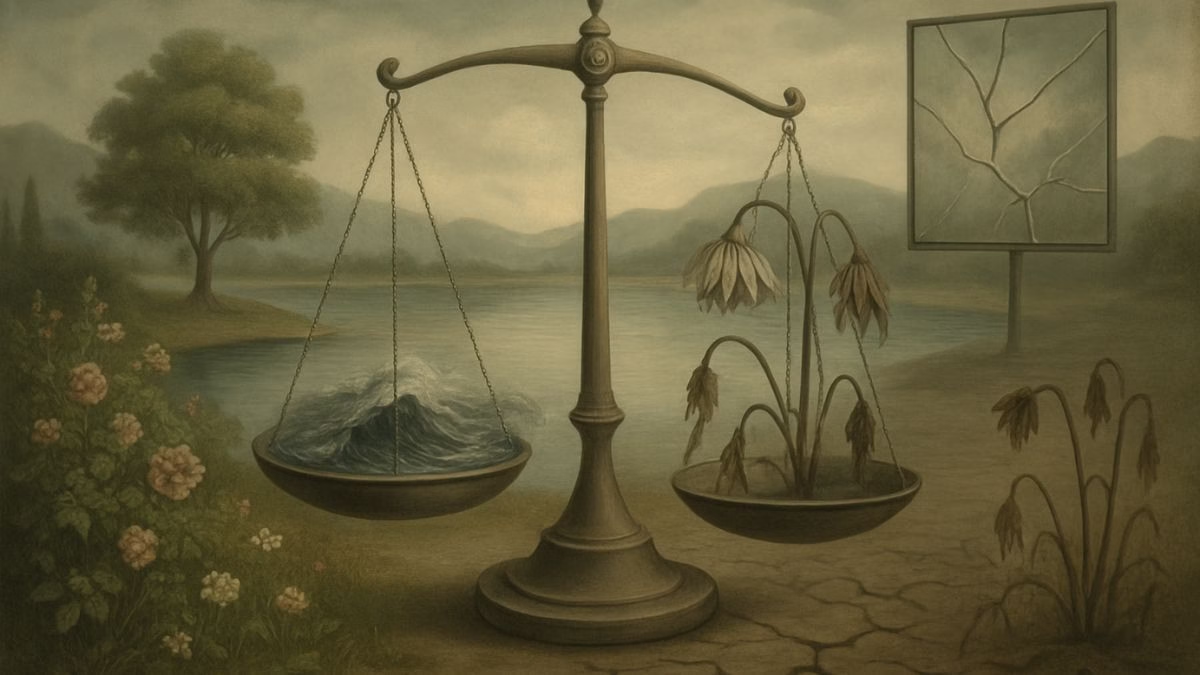Have you ever been in a situation where you felt like your kindness was being used as a weapon against you? Where your willingness to listen, to be open, was seen not as a strength, but as a doorway to be kicked in? This is the heart of a philosophical puzzle that is more relevant today than ever: to preserve a tolerant society, must we refuse to tolerate intolerance? It sounds like a riddle wrapped in an enigma, but it’s the core of the Paradox of Tolerance. It forces us to ask a deeply uncomfortable question: If we create a paradise of open-mindedness, do we have to post a guard at the gate to keep out those who would burn it all down?
The Open-Door Policy That Lets the Wolves In
Let’s throw a little party in our minds. The theme is “Ultimate Acceptance.” Everyone’s invited. The music is a beautiful mix of every genre, the food is a potluck of global cuisine, and the only rule is: be yourself and accept everyone else. It’s a beautiful scene, right? People are debating, laughing, sharing. Now, someone new walks in. They’re not here to enjoy the party. They start telling the jazz lovers that their music is degenerate. They go to the buffet and start throwing out dishes they deem “impure.” They start shouting that only their way of partying is correct, and everyone else should be kicked out. Now, what do you do? According to the party’s only rule—”accept everyone”—you have to let them stay. You have to tolerate their behavior. But if you do, how long will your beautiful, inclusive party last before it’s just them, alone in a wrecked room?
This is, in a nutshell, the paradox of tolerance, famously laid out by the philosopher Karl Popper in 1945.1 He wasn’t thinking about house parties; he was staring into the abyss of post-World War II Europe, wondering how entire nations, seemingly civilized and modern, could have succumbed to the hateful ideologies of fascism. His conclusion was chillingly simple: unlimited tolerance must lead to the disappearance of tolerance. If we extend our tolerance to those who are fundamentally intolerant, the tolerant will be destroyed, and tolerance with them.2 In other words, the open-door policy, without a bouncer, eventually lets the wolves in to eat everyone, including the person who opened the door.
But Wait, Isn’t Being Intolerant… Well, Intolerant?
I can feel the gears turning in your head right now because they’re grinding in mine, too. “Hold on,” you might be thinking, “If we start being intolerant of the intolerant, doesn’t that make us the bad guys? Aren’t we becoming the very thing we claim to despise?” This is the brilliant, maddening knot at the center of the whole thing. It feels like a logical trap. It feels deeply hypocritical. And if we’re not careful, it can be.
But Popper had a nuance here that is absolutely crucial. He wasn’t advocating for pre-emptively shutting down every opinion we don’t like. He wasn’t talking about silencing someone because their political views are different or because they have a strange taste in music. He argued that we should first try to counter intolerant ideas with rational argument, with public debate, in the great “marketplace of ideas.” We should meet bad speech with better speech. But—and this is the giant, flashing, neon “but”—what happens when they refuse to play by those rules? What happens when they meet our arguments not with counter-arguments, but with fists? What happens when they declare that debate is pointless and that their goal is to silence us, by force if necessary? That, Popper said, is the moment the line is crossed. At that point, defending tolerance requires us to stop tolerating them. It’s not an act of aggression; it’s an act of societal self-defense. It’s the immune system kicking in to fight a virus that wants to kill the host.
The Line in the Sand: Where Does Tolerance End?
So, where is that line? Where does an idea cross over from being merely offensive or disagreeable to being an existential threat to the tolerant society itself? That, my friends, is the million-dollar question, and there’s no easy, one-size-fits-all answer. It’s a blurry, shifting line in the sand, and we, as a society, are constantly trying to figure out where it is. Does it get drawn at direct calls for violence? At the spread of disinformation that demonstrably leads to harm? At ideologies that explicitly seek to strip rights away from certain groups of people?
This isn’t just an abstract debate for philosophy classrooms. It’s the very tension that animates our most heated public arguments. Think about the debates over free speech on college campuses and social media platforms. One side argues for an almost absolute freedom of expression, believing that all ideas, even monstrous ones, should be allowed to compete. The other side argues that allowing hate speech to fester creates an environment where marginalized groups are silenced, threatened, and harmed, thus making the space less free for them.3 Both sides, in their own way, are arguing for a version of freedom. Both are wrestling with Popper’s paradox, whether they know it or not. They’re trying to figure out if the party is better served by letting everyone have a microphone, or by taking the microphone away from the person yelling “Fire!” in a crowded theater.
From Popper’s Parlor to Your Personal Life
Now, let’s bring this down from the high-flying kites of political theory and let it land right in our own backyards. This paradox doesn’t just play out on the world stage; it plays out in our lives, in our relationships, in the quiet chambers of our own hearts. Think about that friend who constantly makes “jokes” at your expense, who belittles your passions, who drains your energy. You tolerate it because you value harmony, because you believe in seeing the good in people, because you’re a tolerant person. But at what point does your tolerance of their intolerance toward your feelings start to destroy your own peace? At what point does your open-door policy for them close the door on your own well-being?
It’s the same principle. You try to meet their behavior with rational argument (“Hey, it hurts my feelings when you say that”). You try to counter it with reason. But if they refuse to meet you on the field of mutual respect, if their goal isn’t to coexist but to dominate, then the only way to preserve your own “tolerant” inner society is to become intolerant of their destructive behavior. It’s called setting a boundary. And setting a boundary is, in its essence, drawing a line in the sand and saying, “My tolerance ends here.” It’s not an act of hate; it’s a radical act of self-preservation. It is the soul’s own version of Popper’s paradox. It can be a moment of profound sadness, to close a door you so wanted to keep open, but sometimes, it’s the only way to keep the house from being torn apart from the inside.
The Heavy Weight of Being the Gatekeeper
Here’s the scary part, the part that should keep us humble. If we accept that tolerance requires limits, it immediately raises a terrifying question: Who gets to be the bouncer? Who decides which ideas are “intolerant” and beyond the pale? History is littered with horrifying examples of powerful groups labeling dissent as “intolerance” to crush opposition and maintain control.4 The powerful can easily weaponize this paradox to silence the powerless. The line “We must be intolerant of intolerance” can sound an awful lot like “We must be intolerant of those who disagree with us.”
This is why this paradox isn’t a simple instruction manual. It’s not a green light for censorship or a call to arms against anyone we don’t like. It’s a warning. It’s a philosophical fire alarm. It reminds us that freedom is not a passive state of being; it’s an active, difficult, and sometimes contradictory struggle. It requires constant vigilance, not just against the overtly intolerant, but also against the potential for intolerance within ourselves. It demands that we be incredibly precise about what we’re fighting against: not people, but ideologies that seek to destroy the very possibility of rational debate and peaceful coexistence. It’s a tightrope walk over a canyon, and the winds are always blowing.
So, What’s the Answer? (Spoiler: It’s a Question)
If you came here looking for a neat and tidy answer, I’m sorry to disappoint you. The beauty of the paradox of tolerance is that it doesn’t give us a solution; it gives us a better question. It replaces the naive, “Shouldn’t we just tolerate everyone?” with the much harder, more important question, “What are the things we cannot afford to tolerate if we wish to remain a tolerant people?” It forces us to move beyond simple platitudes and engage in the messy, complicated, and essential work of defining our values.
Building a tolerant world isn’t about throwing a party with no rules. It’s about being a thoughtful, discerning host. It’s about cultivating a garden, which means not just planting beautiful flowers, but also having the wisdom and courage to pull the weeds that would choke them out. It’s a constant dance, a perpetual negotiation, a burden that every generation has to pick up and carry for itself.
So, I’ll leave you with the question that sits at the heart of it all. Where do you draw the line? Not for society, but for you. When does an idea, a behavior, or a person cross that invisible threshold from being something you disagree with to something you believe is a genuine threat to the very fabric of peace and tolerance you hold dear? And what are you prepared to do about it?
I’d love to hear what you think. Drop your thoughts in the comments below.







0 Comments